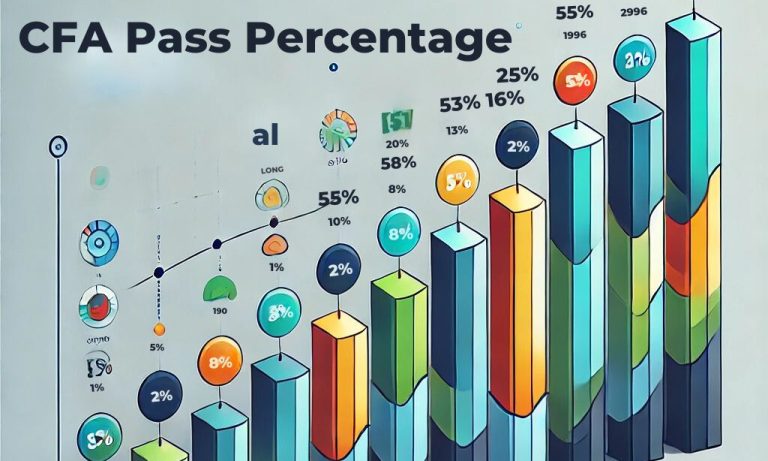CFA pass percentage is one of the most talked-about metrics when it comes to the CFA (Chartered Financial Analyst) exams. The CFA exams are known to be very tough and challenging, and knowing the pass percentages will help the candidates set realistic expectations. The pass percentage for CFA indicates the percentage of candidates passing the CFA exams. It is often used as a measure of the difficulty level of the exam. This article will dive deep into the various aspects of the CFA exams, including its eligibility requirements, syllabus, fees, salary prospects, and most importantly, the CFA passing percentage.
What is CFA?
The CFA (Chartered Financial Analyst) designation is one of the most prestigious credentials in the finance industry. The CFA program is designed for professionals who seek to advance their careers in investment management, financial analysis, and other areas of finance. This certification, awarded by the CFA Institute, demonstrates a candidate’s expertise in financial markets, portfolio management, and financial analysis.
To acquire the CFA designation, candidates have to pass three levels of exams (Level I, Level II, and Level III) while obtaining work experience relevant to the industry. CFA exams test the knowledge and awareness of candidates in the fields of economics, financial reporting, corporate finance, portfolio management, and ethics.
CFA Pass Percentage
The CFA pass percentage is a crucial metric that gives candidates an insight into how challenging the CFA exams are. The pass percentage varies across the three levels of the CFA program. Historically, the pass percentage has been lower for Level II and Level III exams, which are considered more advanced and rigorous than Level I.
- Level I: The pass percentage for Level I of the CFA exam generally ranges between 40% to 45%. It is an entry-level exam and primarily tests basic financial knowledge.
- Level II: The pass rate for Level II is typically between 40% to 50%. This level is more challenging, focusing on the application of financial concepts in real-world scenarios.
- Level III: Level III has a pass rate of approximately 50% to 55%. It is regarded as the most difficult level due to the emphasis on portfolio management and essay-type questions.
Pass Rates by Exam Year (Recent Statistics)
| Year | Level I Pass Rate | Level II Pass Rate | Level III Pass Rate |
| 2023 | 43% | 45% | 52% |
| 2022 | 44% | 46% | 53% |
| 2021 | 47% | 44% | 55% |
CFA Eligibility Criteria
Before registering for the CFA exam, candidates must meet certain eligibility requirements set by the CFA Institute. Here’s a look at the key eligibility criteria:
- Education Requirements: A bachelor’s degree (or equivalent) or in the final year of university at the time of registration. Alternatively, candidates with four years of professional work experience in a relevant field may also be eligible.
- Work Experience: To earn the CFA charter, candidates need at least four years of relevant professional experience in investment decision-making.
- Other Requirements: Candidates must be proficient in English and must possess a valid passport.
CFA Syllabus
The CFA syllabus is divided into three levels, each progressively more advanced than the previous one:
- Level I: Focuses on basic knowledge and concepts. Subjects include:
- Ethical and professional standards
- Quantitative methods
- Financial reporting and analysis
- Corporate finance
- Equity investments
- Level II: Emphasizes the application of concepts. Topics include:
- Financial reporting and analysis
- Equity investments
- Fixed income
- Derivatives
- Portfolio management
- Level III: Concentrates on portfolio management and wealth planning. Subjects include:
- Portfolio management
- Asset allocation
- Risk management
- Performance evaluation
Each level has its own set of study materials, and candidates are expected to invest several months of preparation before taking the exam. The CFA Institute also provides study guides, and many candidates opt for third-party prep courses to help them better understand the material.
CFA Exam Fees
The CFA exam fees vary depending on the registration window, and candidates can expect to pay the following:
- Enrollment Fee: The CFA Institute charges a one-time enrollment fee of around INR ₹28574 Approx.
- Exam Fees: For each level of the CFA exam, the registration fees range from around ₹70000 to ₹80000 for early registration, ₹102000 to ₹110000 for standard registration.
- Study Materials: Additional costs may include purchasing study materials, which range from ₹50000 to ₹75000.
While the cost of the CFA program can add up, it is considered an investment that can significantly enhance career prospects in the financial sector.
CFA Salary
A CFA designation opens up numerous high-paying opportunities in finance. Some of the typical career roles for CFA charterholders include financial analysts, portfolio managers, investment bankers, and financial consultants. The average CFA salary in India ranges from ₹6,00,000 to ₹20,00,000 annually, depending on experience, location, and job role.
- Entry-Level Salary: Fresh CFA charterholders can earn between ₹6,00,000 to ₹10,00,000 per year.
- Experienced Professionals: With 5-10 years of experience, salaries can range from ₹12,00,000 to ₹20,00,000 per year.
- Senior Roles: Senior positions such as portfolio managers, fund managers, or directors can command salaries upwards of ₹25,00,000 annually.
Conclusion
The CFA program is an intensive and rewarding certification for finance professionals looking to enhance their careers. Although the pass percentage of the CFA can be low, it indicates the level of difficulty of the exams, and passing them opens the door to lucrative career opportunities. Candidates should prepare well for each level, understand the eligibility criteria and syllabus, and be aware of the costs associated with it. Despite this challenge, the CFA degree remains a precious badge for anyone aspiring to pursue professional success in the finance business.
CFA Pass Percentage FAQs
What is the CFA pass percentage for 2023?
The CFA pass percentage for 2023 was 43% for Level I, 45% for Level II, and 52% for Level III. These numbers reflect the difficulty of the exams, with passing rates being lower for advanced levels.
How much does it cost to take the CFA exam?
The CFA exam fees vary by registration period, ranging from ₹70000 to ₹80000 per level. There is also a one-time enrollment fee of ₹28574 Approx, and additional costs for study materials.
Can I apply for CFA if I don’t have a degree?
Yes, you can apply for the CFA exam if you have four years of professional work experience in a relevant field, even without a degree.
What is the salary of a CFA in India?
The salary for a CFA charter holder in India can range from ₹6,00,000 to ₹20,00,000 annually, depending on experience and the industry.
How difficult is the CFA exam?
The CFA exam is considered very difficult due to its comprehensive syllabus and the high level of knowledge required. The passing percentages reflect the exam’s difficulty, with only around 40-45% of candidates passing Level I.


